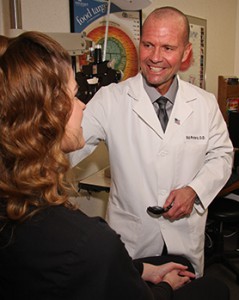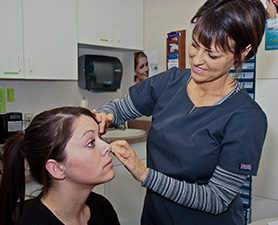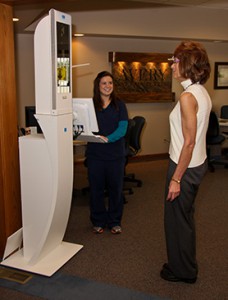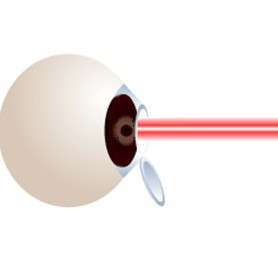Eyecare Services

Comprehensive Eye Examinations
Our comprehensive eye examinations evaluate your eyes, both inside and out, for any potential disorders or diseases. Your visual skills and abilities are carefully evaluated and appropriate treatment is prescribed – whether it’s medication, lenses or low vision rehabilitation. All of our doctors have extensive residency training and are prepared to handle whatever your eyecare needs may be.
Technology is rapidly changing the eye care industry. We utilize the latest in diagnostic equipment and are committed to keeping up with whatever advances will come next.

Contact Lenses
We have been fitting specialty contact lenses for years and have seen some incredible changes in that time. By far the most exciting changes have occurred in the last few years. Although rigid contact lenses are a shrinking segment of the industry, we still have a large number of patients who wear them.
The gas-permeable lens materials available today far surpass those available just a few years ago in terms of eye health and comfort.
Allergies can be particularly annoying to contact lens wearers. In the past many people had to quit wearing their lenses for a month or two during the allergy season. New lens materials and allergy medications have made it possible for these people to eliminate itchy eyes. These medications such as Patanol and Alocril are amazingly effective and safe even in children as young as three.

Optical Dispensing
Our optical laboratory has the latest in equipment to not only fabricate your glasses, but to maintain and repair them should they become broken or damaged. We are able to tint, coat, harden and edge spectacle lenses. We are able to provide you with any frame or lens design available. Our highly qualified Opticians are able to adjust and fit your glasses to you for extended comfort and vision.
Frames:
- Designer Lines
- Safety Frames
- Sports Frames
- Kids Frames
- Sunglasses
- Spring Hinges
- Lightweight Spaceage
- Metals
- Large Selection
Lense Features:
- Thin, Lightweight Lenses
- Safety Lenses
- Polycarbonate Lenses
- Progressive Lenses
- Computer Lenses
- Sports Lenses
- Transition Lenses
- Special Tints
- Anti-Reflective Coatings
- Ultra-Violet Protection

Laser Vision Correction
Everyone is talking about LASIK. Here is a brief description of the procedure.
A flap is cut in the cornea and then the flap is gently folded back. An Excimer Laser is used to reshape the cornea, much like a contact lens forms a new shape on the cornea, only the laser is permanent. The flap is then put back in place, acting like a natural bandage.
The “Wow!” effect of Lasik is the very rapid recovery of vision and the decreased level of discomfort post-operatively. You hear from people that they did not feel anything, and could see well the very first day. Most people have functional vision in 24-48 hours, although this is true in some cases, it must be noted that each person will heal at a different rate. Vision, although greatly improved immediately after surgery, continues to improve for some weeks, even months.
Everyones eyes are different. Even though you may have had a friend who has had LASIK, it does not mean it is right for you. If you are interested in laser vision correction, we will be happy to guide you in picking the right surgeon, procedure and laser appropriate for you. For many of you who are long-term contact lens wearers my pre-operative input can make the difference between an excellent result and a mediocre one.
Post-operatively we can monitor your eyes, and taper medications to arrive at the best possible result. After all, no one knows your eyes better than your optometrist.

Preventative Vision Care
Vision, in the broadest sense, is the global ability of the brain to extract, process and act on information presented to the eye. This complex process can be thought of as three major but related areas: visual acuity, which is largely dependent upon refractive status and eye health; visual efficiency skills, representing eye focusing, teaming, and tracking skills; and visual information processing, representing the ability to recognize and discriminate visual stimuli and to interpret them correctly based upon previous experience. Every examination we provide, regardless of age, has these thoughts in mind.
